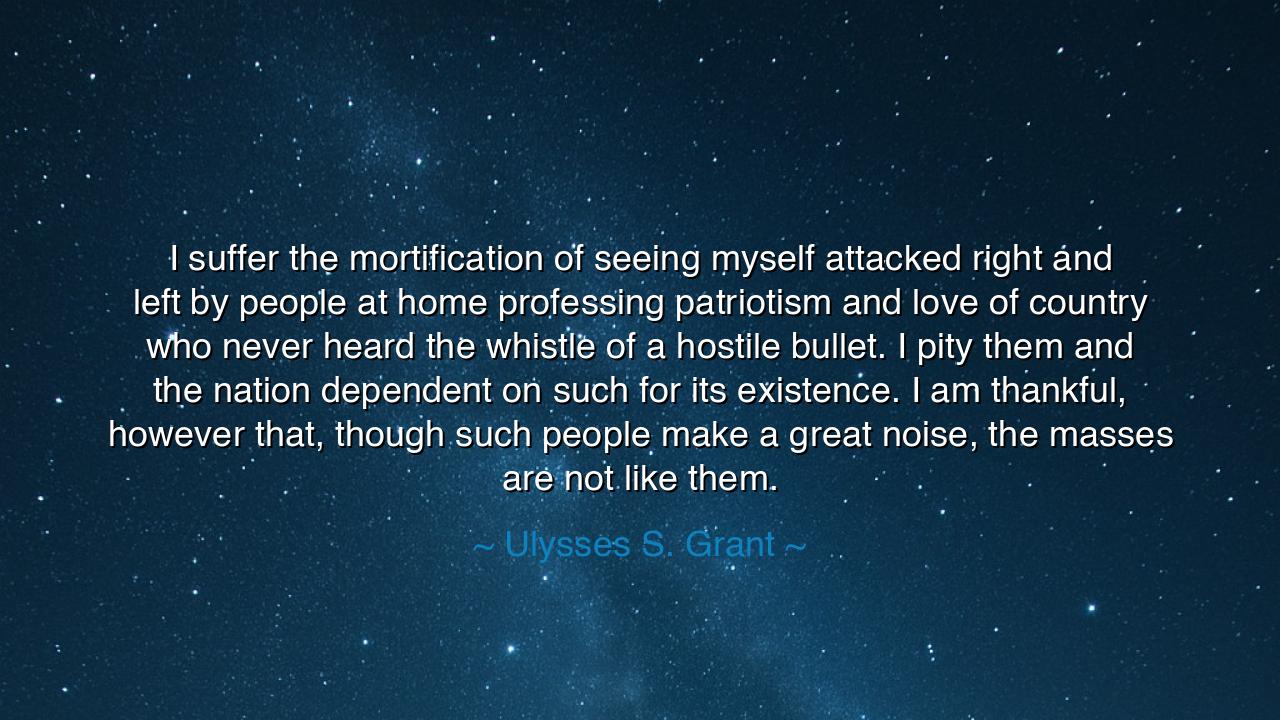
I suffer the mortification of seeing myself attacked right and
I suffer the mortification of seeing myself attacked right and left by people at home professing patriotism and love of country who never heard the whistle of a hostile bullet. I pity them and the nation dependent on such for its existence. I am thankful, however that, though such people make a great noise, the masses are not like them.






“I suffer the mortification of seeing myself attacked right and left by people at home professing patriotism and love of country who never heard the whistle of a hostile bullet. I pity them and the nation dependent on such for its existence. I am thankful, however, that, though such people make a great noise, the masses are not like them.” These words of Ulysses S. Grant, the stoic general and later President of the United States, resound like the lament of a warrior who has returned from battle only to find that his truest struggles are not with enemies abroad, but with critics at home. Spoken during the bitter years after the Civil War, they reflect the pain of one who has sacrificed deeply for his nation, only to see his devotion questioned by those who have never known the weight of war’s cost.
Grant’s quote emerges from the crucible of a time when the wounds of America still bled. He had led men through the storms of Shiloh, Vicksburg, and Appomattox, where courage was tested in fire and blood. He had seen men fall beside him, their patriotism not shouted from pulpits or parlors, but written in the red soil of the battlefield. To be accused of disloyalty or selfish ambition by those untouched by danger — those who, as he said, had never heard the whistle of a hostile bullet — was a wound of a different kind. His words reveal the sorrow of the seasoned warrior, who knows that true patriotism is not loud but steadfast, not boastful but proven.
In every age, there are those who wrap themselves in the flag but refuse the burden it represents. They speak of love of country, but only as ornament, never as duty. Grant saw such men and pitied them — not out of contempt, but out of compassion for their blindness. They knew nothing of sacrifice, of the weight of command, of the haunting faces of soldiers left behind. Their patriotism was made of words, not deeds; their courage, of noise, not endurance. And yet, Grant did not despair. He knew that the masses — the ordinary people — were different. They were quiet, humble, and resilient. They did not shout of patriotism, yet they carried it in their bones.
There is an old story, told of a soldier returning from war in ancient Rome. He walked through the streets in torn armor, uncelebrated, while the citizens argued politics in the marketplace. One man, richly dressed, mocked the scars upon his face. The soldier replied, “These are the marks that bought your peace.” And he walked on. The spirit of that soldier lives in Grant’s words. For the heroes who bear the true cost of peace seldom boast. They serve, suffer, and are often misunderstood — yet history remembers them long after the noise of the crowd fades away.
Grant’s lament also holds a mirror to every generation. It warns us that the health of a nation depends not on the volume of its declarations, but on the integrity of its people. When a society begins to exalt words over deeds — when those who risk nothing become the loudest judges — it loses the moral thread that binds it. Patriotism without sacrifice is a hollow trumpet, blaring loudly but leading nowhere. It is those who labor quietly, who act from love rather than vanity, who preserve the true soul of a country.
And yet, Grant’s final words — “I am thankful… that the masses are not like them” — shine with hope. He recognized that the heart of the nation beats not in its politicians or its critics, but in its common folk — the farmers, the workers, the mothers who endure, the veterans who remember. These are the people who do not speak loudly of virtue, but live it. In them lies the strength of a republic. In them lies the quiet patriotism that endures storms and rebuilds ruins.
So, my listener of the future, learn from this: do not mistake noise for courage, or words for service. If you would love your country, do so not in proclamation, but in action. Serve it in your honesty, defend it in your compassion, and honor it in your labor. Speak not too quickly of loyalty until you have borne its burden. And when you see those who mock what they do not understand, pity them, as Grant did — but never let their voices drown your own duty. For the fate of nations depends not on the clamor of the proud, but on the quiet strength of the faithful, who keep their eyes steady and their hearts true, even when the bullets — real or unseen — begin to fly.






AAdministratorAdministrator
Welcome, honored guests. Please leave a comment, we will respond soon